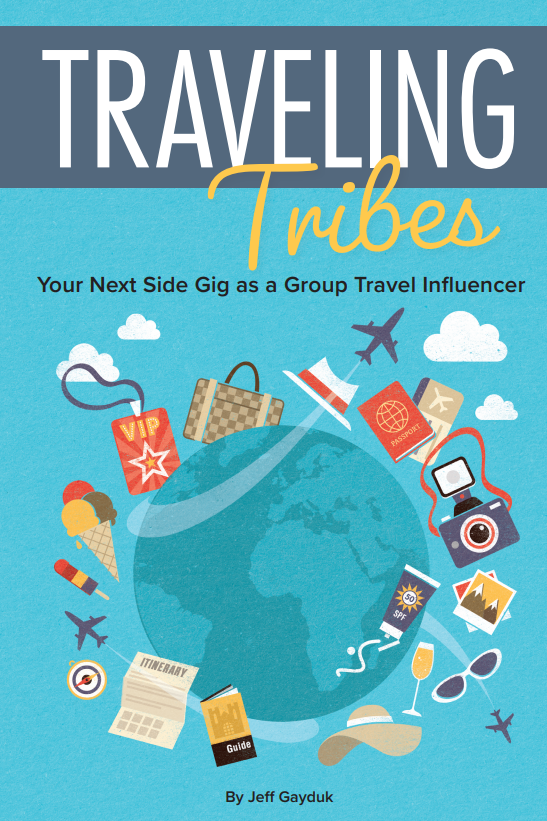Traveling Tribes Podcast
Your Next Side Gig as a Group Travel Influencer Starts HereOur Podcast Episodes
Jan 12, 2024 • In this captivating episode of the Traveling Tribes Podcast, the charismatic host Jeff Gayduk invites distinguished guests from Heritage Clubs International, the premier bank marketing organization in North America. Joining the conversation is Ted Nelson, Andy Ziegler, and Michael Ziegler. Listen as they delve into the fascinating origins of Heritage… Jan 5, 2024 • In this episode of the Traveling Tribes Podcast, host Jeff Gayduk sits down with Catherine Prather, the dynamic representative from the National Tour Association (NTA), to delve into the challenges facing the travel industry. Prather sheds light on the ever-evolving landscape, emphasizing the resilience and adaptability of tour companies amidst… Dec 15, 2023 • In this exciting episode of Traveling Tribes, your host Jeff Gayduk takes you on a journey through the frothy landscapes of craft beer, joined by the charismatic Glenn Smith, the founder of Brewery Tours. Discover the hidden gems and local favorites as Jeff and Glenn discuss the symbiotic relationship between… Oct 30, 2023 • Our special new episode features two guests, Arden from Girls Who Travel & Alex from G Adventures. Defining women in the travel business, Alex and Arden discuss both of their businesses, how they collaborate and support groups in travelling, their tips to success in the travel business and more! G Adventures… Aug 16, 2023 • This week, we welcome Jim Marini from Railbookers Group, which specializes in creating seamless and convenient train vacations for travelers. Hear about rail travel in the U.S. and overseas, the details of Amtrak Travel, and the benefits to booking rail travel. With Railbookers, booking a train vacation is easy, stress-free,… Jul 20, 2023 • Time to break the ice with Nicole Mahoney as we hear about how Nicole managed her two companies through a pandemic, acquired Travel Alliance Partners, their unique marketing tactics, the marketing industry and how influencers might be the revolution of modern marketing. Nicole Mahoney owns two companies, and Break the… Jun 23, 2023 • Our special guest this week hails from Group Travel Odyssey, but he's here today to talk about Group Experience, a great tool for tour Operators. Listen in to learn how tour operators can consolidate their planning to one place with organization and search tools, pricing options, upcoming expansions within the app, and… Jun 9, 2023 • For this episode, we welcome Nasi Peretz, the Chief Technology Officer for the Hornblower Group. Mr. Peretz lends his expertise in the many businesses overseen by the Hornblower Group, how he and his team introduced new ticketing technology to attractions with Anchor, how Anchor is personalized for many types of… May 18, 2023 • Our latest guest is Alexander Glos, an accomplished individual working with I2I, a prominent company at the forefront of technological innovation. In this episode, hear about how social media influences travelers from China, how air travel will be affecting the inbound and outbound market, how best to reach Chinese inbound… Apr 20, 2023 • If you're looking for the group tour leader that can do it all, you've found her. Theresa Nemetz is the Founder & President of Great Lakes Shore Excursions, Milwaukee Food & City Tours, Chicago Food Tours, and Travel Deliciously. Drawing on her expertise in the market, find out from Theresa…

38: Heritage Clubs International

37: Catherine Prather from the National Tour Association

36: Glenn Smith from Brewery Tours

35: Arden from Girls Who Travel & Alex from G Adventures

34: Jim Marini from Railbookers Group

33: Nicole Mahoney from Break The Ice

32: Keith Snode from Group Experience

31: Nasi Peretz from Hornblower Group

30: Alexander Glos from I2I

29: Theresa Nemetz from Great Lakes Shore Excursions, Milwaukee Food & City Tours, Chicago Food Tours, and Travel Deliciously
Listen Where You Get Your Favorite Podcasts


